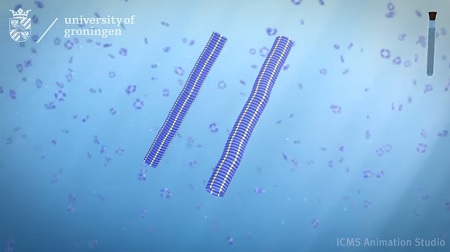Professor Sijbren Otto wint eervolle Royal Society of Chemistry Award
Aan hoogleraar Systeemchemie Sijbren Otto van de Rijksuniversiteit Groningen (RUG) is de Supramolecular Chemistry Award 2018 van de Britse Royal Society of Chemistry toegekend. Otto ontvangt deze tweejaarlijkse prijs voor zijn bijdrage aan het onderzoek naar moleculaire netwerken en systeemchemie. Een belangrijk deel van zijn huidige onderzoek is gericht op chemische evolutie. Als onderdeel van de prijs zal Otto een aantal lezingen in Groot Brittannië geven.
"Ik ben erg vereerd door deze prijs", zegt professor dr. Otto. "Het is mooi om zo’n erkenning van mijn collega’s te krijgen." Ieder jaar geeft de Royal Society of Chemistry prijzen aan scheikundigen uit verschillende vakgebieden. "Op de lijst met voormalige winnaars van de Supramolecular Chemistry Award staat een aantal grote namen, dus het is prachtig om daar nu tussen te staan." De prijs, die later dit jaar wordt uitgereikt, bestaat uit een medaille, 2.000 Britse ponden en een lezingentour.

Samenwerkende moleculen
Supramoleculaire chemie is het vakgebied dat de interactie tussen moleculen bestudeert. "Chemie was heel lang gericht op het maken van moleculen. Via supramoleculaire chemie willen we de volgende stap zetten door verschillende moleculen te laten samenwerken, bijvoorbeeld in complexen die ontstaan door zelforganisatie." Door zijn onderzoek naar dit soort complexen ontdekte Otto moleculen die hun eigen productie kunnen katalyseren: kleine moleculaire ringetjes stapelen zich op tot draadjes die groeien en zich vermenigvuldigen door te breken. Het resultaat is een vorm van chemische evolutie, die mogelijk lijkt op de manier waarop ooit leven is ontstaan uit levenloze materie.
Chemische evolutie
De laatste paar jaar zag Otto zijn evoluerende moleculen verschillende stappen zetten richting echte ‘open-einde’ Darwiniaans evolutie, waarbij het systeem nieuwe eigenschappen kan uitvinden zonder hulp van een scheikundige. "We komen steeds dichter bij dit doel’" vertelt hij. Supramoleculaire chemie heeft al geleid tot toepassingen variërend van een moleculaire sensor tot een moleculair complex dat na een operatie het spierverslappende middel rocuronium bromide uit de bloedbaan van patiënten haalt. "Maar ons werk aan chemische evolutie heeft een heel ander soort impact. Dat kan een antwoord geven op de vraag hoe leven op aarde is ontstaan." Otto is dan ook lid van bestuurscomité van het Nederlandse Origins Center, dat zich richt op vragen over de oorsprong van leven op aarde en in het universum.
The Royal Society of Chemistry Award
Onder de eerdere winnaars van een Royal Society of Chemistry Award zijn Otto’s RUG-collega’s Syuzanna Harutyunyan (winnaar van de Homogeneous Catalysis Award in 2017) en Ben Feringa, die de Royal Society of Chemistry Centenary Prize won, eveneens in 2017 en daarnaast nog een Royal Society of Chemistry award ontving in 2011, 2012 and 2013. Alle drie zijn ze verbonden aan het Stratingh Instituut voor Chemie van de Faculty of Science and Engineering van de RUG. Niet minder dan vijftig ontvangers van een Royal Society of Chemistry Award hebben later een Nobelprijs gekregen voor hun werk, onder wie natuurlijk ook Feringa.
Meer nieuws
-
17 februari 2026
De lange zoektocht naar nieuwe fysica
-
10 februari 2026
Waarom slechts een klein aantal planeten geschikt is voor leven
